- Home
- Aaron Allston
Mercy Kill Page 7
Mercy Kill Read online
Page 7
“It was a prefab! Built in the factory to be exactly that way. Not assembled here. Costs more. Better, right?”
Myri sighed. “At least there are signs for some gambling halls. I can earn some spare credits here.”
The population was mostly human, but a variety of nonhumans were scattered throughout. Most seemed to be civilians, dressed in casual or work clothes, but Voort saw occasional groups of soldiers as well.
Trey had apparently done his research on the distinctions among local soldiery. He pointed to one pair of troopers standing on a street corner, their uniforms brown, their rank insignia indicating they were privates. “Off-duty troops. The city’s economy runs on catering to off-duty soldiers.”
Voort crossed his arms. “So we can expect most of the businesses hereabouts to be—what’s the word in Basic?—sleazy.”
“Maybe not.” Myri sounded hopeful.
Voort snorted. “I’ll bet you ten credits Ackbar City doesn’t even have an orchestra.”
“You’re on.”
“An orchestra of living musicians. Not a droid orchestra.”
Myri made an unhappy face. “Bet’s off.”
Trey pointed out another group of soldiers, a quartet. They were in brown uniforms as well, but carried blaster rifles and wore torso armor and helmets in black. “Guard patrols. The city gets its city guard services from the army base.” The four troopers were in fact keeping a close eye on passing landspeeder and pedestrian traffic.
“Interesting.” Voort filed that fact away. Any deviation from normal social or governmental structure was a potential weakness or wrinkle to exploit.
Trey pointed ahead and to the right. “Pop-Dog.”
Voort peered in that direction, curious about General Thaal’s favorite brand of elite troopers.
The woman Trey had indicated was of average height and fit. Her uniform was similar to those of the on-duty guards, but with some embellishments. Sewn along the collar of her brown tunic was a pattern of white triangles—Voort took a moment to recognize them as stylized teeth. There were single tooth insignia on either side of her helmet. Ruddy of complexion and stern-faced, she stood listening to the words, apparently pleas, of a tan-skinned Bith shop owner. They stood outside the door of a bakery; across the door was a strip of broad red tape reading CONDEMNED. The Bith, the dome of his hairless head and his black eyes gleaming in the morning sun, gestured persuasively as the Pop-Dog shook her head. Then that scene, too, was past.
Voort kept his eye on the Pop-Dog as long as he could. “If General Thaal is the enemy, that, too, is our enemy. And if he’s not corrupt, the Pop-Dogs are still elite soldiers whose backyard we are rooting around in uninvited. So keep alert.”
“Yes, Dad.” Trey consulted his datapad. “Myri, next left.”
Two minutes later they pulled into their destination, the parking area of a small collection of corrugated durasteel buildings, all uniformly gray and weathered. The faded sign on the largest roof advertised the place as TOOZLER’S SPEEDER REPAIR AND MAINTENANCE. Weeds had broken through the lot’s pavement in several places, indicating that the establishment had been abandoned for some time.
The main building of the little business was a long two-story structure, enclosing the bays for vehicle repairs, now stripped of lifts and hoists and tools. To its left was an office building with a waiting area and a refresher downstairs and a small apartment upstairs. To its right, a storage building, now empty but for the smell of chemicals and plastic parts. The three buildings were joined by short duraplast-walled passages no more than a meter in length. The unlined walls of the main building rippled and rattled when the wind blew.
Voort, Myri, and Trey spent a few minutes sweeping the place for transmitters; finding none, they spent a few more minutes planting some of their own, tiny listening devices and holocams that would show them movement on the traffic lanes outside and alert them to stealthy visitors. They taped lengths of opaque black flimsiplast over all the windows. Trey went up on the roof to add a banner proclaiming COMING SOON—BINI’S SPEEDERIUM to the sign there.
They parked the speeder in the main building. Their bags went into the office building, where Trey set up, on what had been the business counter, the communications and computer gear they had brought. He glanced over the monitor and shook his head. “No burst traffic yet from the blaster battery droids.”
Voort peered over Trey’s shoulder but could make no sense of the numbers and flashing updates on the screen. “What does that mean? Have they been discovered? Maybe the army will keep them for months as evidence on Coruscant.”
Trey shook his head. “Noooo … They were bound for Fey’lya Base, so they’ll get there soon enough. But if the base has all the blasters it needs for the time being, it might be days or weeks before they get uncrated and issued.”
Voort grunted. “Well, let’s hurry things along.”
Myri and Trey stared blankly at him.
He stared back, slowly shaking his head. “You don’t have the faintest idea of what I’m talking about, do you?”
“No.” Myri sounded confused. “We’re supposed to wait until some of the droids are activated, then begin collating the data they send …”
“Which, as Trey said, could be days or weeks.” Voort tried not to let impatience creep into his voice. “But what if, say, several base troopers have an encounter here, planetside, that puts their blaster rifles out of commission?”
“They’d be assigned new ones.” Trey brightened. “And the new ones they’re assigned might be ours, or ours might just move up the queue, have to be checked out, allowing the droids to become active …”
Voort gave him an approving nod. “You don’t wait for things to happen in this business, son. You make things happen.”
Myri grinned, obviously relishing the lesson in old-school Wraith techniques that was to come. “Tell us.”
“This scam relies on the fact that Ackbar City does not have its own police or guard force.” Voort pondered for a moment. “We’ll need … one smallish hydraulic metal press, not traceable to us, transportable in our speeder. Six or eight addresses of abandoned homes in low-rent districts. Six to eight comlinks with unregistered ownership, disposable, to make calls to the military police on. A second pseudo-safe house a lot like this one, again not traceable to us. Spray paints in assorted colors. Disguises for you and Trey. And, if we can, sound recordings of Kowakian monkey-lizards in a state of rage.”
Trey grinned. “I think I’m going to like this job.”
Hours later, two army troopers, one male, one female, both human, paused at the front door of the small dwelling. It wasn’t much of a home, a prefab that looked as though it had begun its existence as a section of durasteel pipe some three meters in diameter and fifteen in length. Saw the pipe in half lengthwise, set it cut-edges down on a permacrete foundation, cap it at both ends with walls with doors in them, and paint the whole thing an unappealing dirt color, and there it was, a dwelling fit for people with no money, no taste, or both. The dwelling matched the low-income neighborhood that surrounded it.
The female trooper, whose name tag read SGT. DOBI, pressed the signal button beside the door. “I hate domestic disturbance calls. The people get into knock-down drag-outs with one another, then we show up to restore order and they come after us with vibroblades.”
The male, whose badge read CPL. VITKINS, shook his head. “This one had animal noises. How many of them include animal noises?”
“Well, all right, maybe they’ll end up throwing sand panthers at us instead.”
“You’re a pessimist.”
The light above the doorway came on and the door slid aside. Just inside stood a human man—tall, strongly built, dressed in a worker’s gray clothes. It was impossible to make out much of his features, for half his face was swathed in white bandage and the other marked with livid bruises. His right arm was supported in a forearm-to-elbow sling that looked as though it had been improvised from torn bedsheet
s.
He peered out at them from under a mop of black hair, his eyes miserable. “Cah I hep you?”
Sergeant Dobi suppressed a wince of sympathy. “A pedestrian commed the local guard station with complaints of a disturbance. We need to speak to you. Inside.”
“Ob courfe.” The resident stepped aside to let them enter.
Inside, they looked around. The room was almost bare—two folding durasteel chairs and a rickety table of local wood, a monitor atop it, constituted all the furniture.
The resident began explaining before the front door had quite slid shut. “Mah houfemate and I had ad argoomenf.”
Sergeant Dobi nodded. “It looks like you got the worst part of it.”
“Ah ahwayf do.”
“Always do—this is a regular occurrence?”
“Efery time he getf Cowellian applef.”
The troopers looked at each other. Corporal Vitkins pulled out his datapad. “What sort of species gets violent after eating Corellian apples?”
“One ob a kind. Genetically augmented Kowakiad monkeylifard.”
Sergeant Dobi checked her blaster rifle, made sure it was set on stun and at full power. “Tell me you’re joking. Genetically augmented?”
“Oh, he’f huge. A metew an a haff tall.”
Corporal Vitkins gave the resident an appalled look, then ran a couple of quick searches on his datapad. “Look, I’m not seeing a rental or purchase contract on this dwelling, nor any record that there’s a modified Kowakian monkey-lizard anywhere on Vandor-Three.”
“We juff moved in yefterday. And he’f not on the record. I … fmuggled him onplanet.”
Vitkins hurriedly tucked away his datapad and checked his rifle. “A dangerous animal—”
“He’f not dangewouf! The applef have wown off. You want to fpeak wif him? He’s in the neft woom, napping.”
Dobi nodded. “Yes. Call him out here.”
“Palpy? C’mere, Palpy.”
Noises sounded from the door into the next room, a heavy thump followed by a shambling, scraping sound that caused Dobi’s hair to rise.
That door slid aside, revealing darkness beyond.
And the resident, behind the troopers, spoke again, his voice no longer pained or slurred. “Don’t move. I have blaster pistols aimed at your backs, and you’re also being covered from the other room. Troopers, you are now prisoners of the Quad-Linked Militant Pacifists.”
Dobi heaved a heartfelt sigh. “I hate domestic disturbance calls.”
It wasn’t until a fourth set of troopers responded to a fourth domestic disturbance call and took a suspiciously long time in reporting completion of the assignment that the night-shift officer on duty at the local military police guardhouse noticed the discrepancy. He dispatched a follow-up unit to the first address. They found Dobi and Vitkins, expertly tied and furious, in the abandoned dwelling. The bound troopers’ blasters, both rifle and pistol, were gone. Units dispatched to each of the other disappearance sites found the same thing—bound and disarmed troopers with stories of an unseen genetically augmented monkey-lizard. The officer of the day issued an advisory mandating that all domestic disturbance calls be approached with maximum caution and that units of no fewer than four troopers do the responding.
There were no more false disturbance calls that night. By dawn, army investigators had found the local headquarters of the hitherto-unknown Quad-Linked Militant Pacifists—a small metal shack with an aging hydraulic press in it. Crumpled rubbish that had once been the blasters of eight troopers littered the floor. Fresh graffiti decorated the shack’s inner walls—slogans denouncing all acts of violence. All except those of the Quad-Linked Militant Pacifists.
The army issued orders for the arrest of two suspects, a heavily bandaged human man and a heavily robed woman of indeterminate species, but the trail of the pacifist terrorists seemed to have completely dried up.
Voort sat watching the monitor of Trey’s computer, which received a visual feed from the holocam on the roof. The holocam was trained a few blocks away on the metal shack, where the hydraulic press had been set up. Even now there were army airspeeders parked in front, and forensics personnel moving in and out of the building. “Anyway … That’s how Wraiths spend their first day in a new town.”
Myri, stretched out on a cot at the back of the office but not sleeping, yawned. “Tiring. But fun.”
Voort nodded. “With an extra day or two, we could have come up with a giant monkey-lizard costume for me. But you have to work within your operational limitations.”
“I’m going to tell Bhindi she ought to blame the original blaster heist on Coruscant on the Quad-Links.” Myri yawned again. “After I get some sleep. You know, to make the Quad-Links sound more widespread. More formidable.”
Trey, slumped in a chair, popped awake for a brief moment. “Good idea.” Then he focused on the monitor and frowned. “Hey. We’ve received a burst message from one of the droids.” He reached up to brush at the monitor screen, sweeping away the image of the distant shack, replacing it with a screen of data fields. The contents of some of the fields blinked.
Trey blinked, too. “Battery Droid Twelve has just signaled itself active.”
Voort permitted himself a satisfied look he knew Trey couldn’t interpret. “Might have nothing to do with what we did last night. But—”
Trey scanned the screen of data. “But it’s always better to be active than reactive. Lesson learned.”
CHAPTER SEVEN
Over the next two days, the trio of Wraiths spent considerable time in front of that monitor, watching footage and interpreting data sent by the battery-pack parasite droid—and then by Droid 12 and Droid 38.
Droid 12 waited nearly a day in its blaster rifle before the conditions surrounding it were such that it could begin activity. When nothing larger than an insect had moved in its vicinity for a couple of hours, it ejected itself and fell to the permacrete floor of a trooper ready room, recognizable on the recording by its weapons racks, equipment lockers, and benches.
On the floor, Droid 12 extruded miniature treads and crawled at a torturously slow pace to conceal itself beneath the bottom shelf of a wall-mounted weapons rack. There it waited for hours, motionless and undetected, its holocam watching ankles and feet during a trooper shift change.
After an hour of stillness and darkness in the room, a tan-colored, dome-shaped floor-cleaning droid rolled into the chamber, and Droid 12 got to work. It crawled out from beneath the weapons rack and transmitted a brief command to the cleaning droid, identifying itself as a floor stain and instructing the droid to scour it up. The cleaning droid obligingly rolled over and atop Droid 12.
“At this point, magnets activate, clamping Droid Twelve to the underside of the cleaning droid.” Trey indicated the screen, which showed only Droid 12’s fisheye point of view experiencing a slight change of altitude as it rose a majestic two or three centimeters off the floor to adhere to the cleaning droid’s underside. “Now Droid Twelve will extend leads to plug into the cleaning droid’s primary communications jack. It’ll begin reprogramming it soon.”
Voort nodded and stretched. “I’m assuming Droid Twelve will detach and subvert more base droids, then find a good place to hide. All the droids it has subverted will transmit their recordings to Droid Twelve at irregular intervals. Droid Twelve will send all that data to us in burst-transmission packets. You’ll integrate and collate the data. Correct?”
Trey gave him a dirty look. “You take all the fun out of it by knowing everything.”
By nightfall, they had portions of the buildings Droids 12 and 38 were in mapped and had their locations superimposed on a satellite map of Fey’lya Army Base. Droid 38 seemed to be locked in a high-security chamber in a storage building where weapons and munitions were kept before being deployed, but Droid 12 was loose in the base’s southern operations center. As the hours passed, Trey began building a three-dimensional walkthrough of that ops center and then surrounding buildings
as more and more domestic droids fell under its sway.
Trey left off maneuvering a virtual point of view around the portions of the base they had mapped. He tapped to activate a persistent blinking light in the upper right-hand corner of his screen. A series of password and security queries popped up. Once he’d typed in a succession of correct answers, the computer opened a screen of text for him.
He glanced at the others. “Orders from Leader.”
Voort and Myri looked up from their sabacc game—Voort with relief, for Myri was annihilating him.
Trey ran through the message’s contents. “Congratulations from Bhindi on the activation of the parasite droids. She says the Wraiths on Coruscant sabotaged a turbolaser assembly line in the name of the Quad-Linkers to lend even more authenticity to the name.”
Myri smiled. “Nice of them.”
“This cell, though. Here on Vandor-Three, we’re to go into maintenance mode and just acquire data until otherwise notified. Voort and I are supposed to rendezvous with the others at Gagrew Station, Si’klaata Cluster. Myri, you remain in charge here.”
“Alone?” Voort frowned.
Myri gave him a suspicious look. “What, you don’t think I’m old enough?”
“That’s not it.” Blast it, that was it, part of the problem. “I just have a … dislike of leaving a team member alone, without support. It’s bad tactics.” But more than that, the thought of leaving Myri behind, of something happening to her, of having to look Wedge in the eyes afterward … Voort tried to force himself to think of her as an adult colleague, someone who’d signed on knowing all the risks of the trade.
He failed. “Trey, send a reply. Ask if we can leave someone behind in addition. To back up Myri.”
Trey shook his head. “No, I don’t think so. If Bhindi thinks she needs both of us, she needs both of us.”
“Stang.”
“Besides …” Myri suddenly sounded cheerful. “Did you hear what Trey said? You’re going to Si’klaata Cluster. That’s Hutt space. I can stay here, wallow in the mud, and eat worms all day, and I’ll still be in a cleaner, nicer place than you two will.”

 Terminator 3--Terminator Hunt
Terminator 3--Terminator Hunt Mercy Kil
Mercy Kil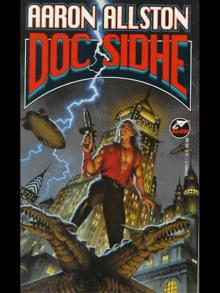 Doc Sidhe
Doc Sidhe Star Wars: Fate of the Jedi: Outcast
Star Wars: Fate of the Jedi: Outcast Fate of the Jedi: Backlash
Fate of the Jedi: Backlash Mercy Kill
Mercy Kill Rebel Stand
Rebel Stand Wraith Squadron
Wraith Squadron Star Wars: X-Wing VII: Solo Command
Star Wars: X-Wing VII: Solo Command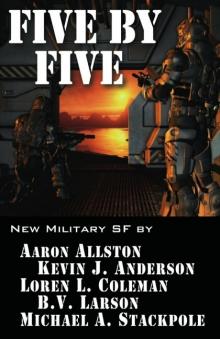 Five by Five
Five by Five Solo Command
Solo Command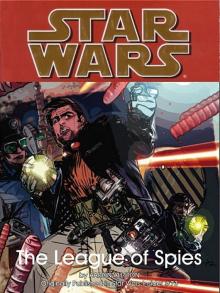 Star Wars: The Clone Wars Short Stories: The League of Spies
Star Wars: The Clone Wars Short Stories: The League of Spies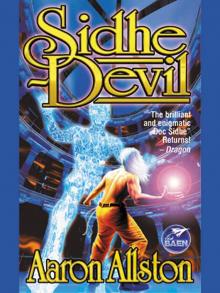 Sidhe-Devil
Sidhe-Devil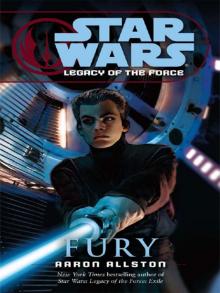 Star Wars: Legacy of the Force: Fury
Star Wars: Legacy of the Force: Fury Starfighters of Adumar
Starfighters of Adumar Star Wars: X-Wing VI: Iron Fist
Star Wars: X-Wing VI: Iron Fist Star Wars - X-Wing - Iron Fist
Star Wars - X-Wing - Iron Fist Exile
Exile Star Wars: X-Wing V: Wraith Squadron
Star Wars: X-Wing V: Wraith Squadron Star Wars - X-Wing - Starfighters of Adumar
Star Wars - X-Wing - Starfighters of Adumar Rebel Stand: Enemy Lines II
Rebel Stand: Enemy Lines II Rebel Dream: Enemy Lines I
Rebel Dream: Enemy Lines I Outcast
Outcast Star Wars - X-Wing 07 - Solo Command
Star Wars - X-Wing 07 - Solo Command